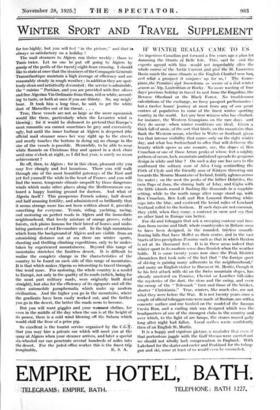. . —
IF WINTER REALLY CAME TO US AN ingenious Canadian put forward a few years ago a plan for damming the Straits of Belle Isle. This, said he-and the experts agreed with him-would not improbably. alter the . whole course of the Arctic Current rind give the St. Lawrence Basin much the same climateas the English Chaiiii* el now has, and Wlla.t. prospect' it conjures' up for us, ! .The Gram- pians,the Pennines, Snowdonia as sec- Um of a real winter season as'Alp, Laureilimn or Rocky.--No more wasting of four days' precious holiday in travel to and from the Engadine, the Bernese Oberland or the Black Forest. No troublesome calculations of the exchange, no fussy passport preliminaries ; but a twelve hours' journey at most from any of our great centres of population to some of the finest winter sporting country in the world. Let any bear witness who has climbed, for instance, the Western Grampians on the rare days -and they do occur-when winter conditions arc ideal. Given a 'thick fall of snow, of the sort that binds, on the mountains that flank the Western ocean, whether in Wales or Scotland, given too that intense visibility that comes only on the right winter day; and what has Switzerland to offer that will dethrone the beauty which opens as one mounts, say, the slopes of Ben Cruachan or one of. those Arran peaks.at whose feet a mighty pattern of ocean, loch, mountain and island spreads its gorgeous design in white and blue ? On such a day one has seen to the southward the solitary cone of Ailsa Craig sentineling the Firth of Clyde and the friendly arm of Kintyre thrusting out towards the Mourne Mountains of Ireland; faintly agleam across the water ; on the west the peaks of the hither Hebrides, the twin Paps of Jura, the shining bulk of Islay, and Giglio with the little islands round it flashing like-diamonds in a sapphire setting, while to the north range after range stood up, with • Ben Cruachan, Ben Ledi and Ben Lomond thrusting white caps into the blue, and eastward the briiad miles of Lowland Scotland rolled to the horizon. If such days are not common, they yield, when they come, a contrast in snow and sea that no other' land in Enroll-Cain better.
For ski and toboggan that ask a sweeping contour and free- dom from ravine and bluff, whole countrysides in Britain seem to have been designed, in the rounded, treeless smooth- flowing hills that have Moffat as their centre, and in the vast tracts of leSs precipitous Pennine such as that in which Buxton is set at its thousand feet. It is in these areas indeed that winter sport in its modern sense does flourish when the weather holds. It is sonic twenty years now since the Peak District chroniclers first took note of the fact that " the foreign sport of ski-ing is gaining many adherents in the aeighbourhoodev and many an English visitor to Davos or St. Moritz, though it be his first attack with ski on the Swiss mountain slopes, has already mastered on Pennine, Cheviot or Lowther hill-sides the mysteries of the dart, the stein and the swing, and even the swoop of the " Telemark " turn and those of the brisker, shorter " Christiania." True, winters, like much else, are not what they were before the War. It is not twenty years since a couple of official toboggan runs were made at Buxton, one with a
concrete surface and one banked on the model of the was Cresta Run, and a curling rink was designed which was the headquarters of one of the strongest clubs in the country and over which, to the light of are lamps, the stones roared gaily long after night had fallen. Local scribes wrote confidently then of an English St. MOritz.
It is a happy and vigoi-OuS picture, a reminder that even if that portentous juggle with the Gulf Stream were carried out we should not wholly lack, compensation in England.. With Lakeland for the skater and curler and Peakland for the tobog- gan and ski, some at leastof us would even be reconciled.






















































 Previous page
Previous page